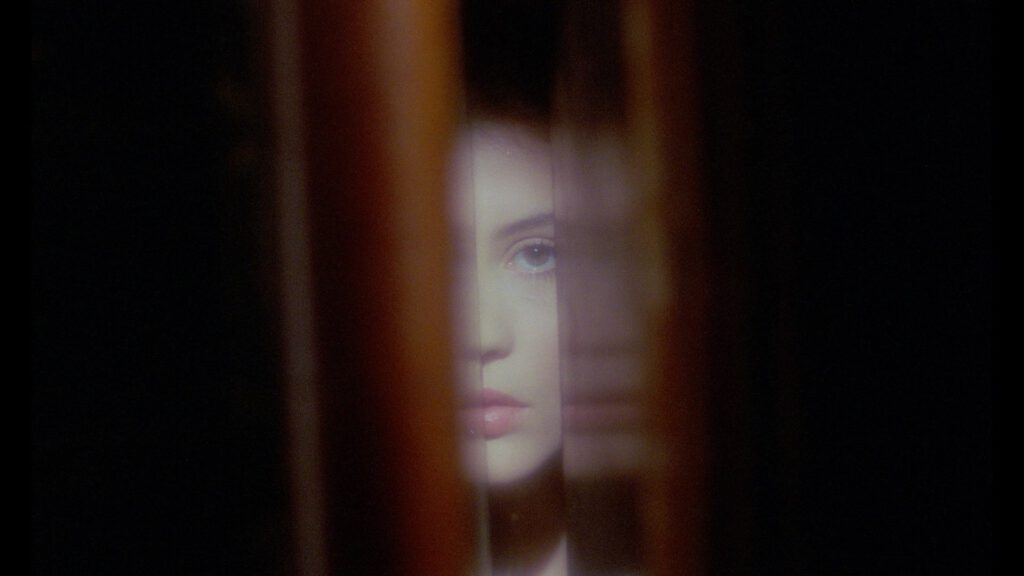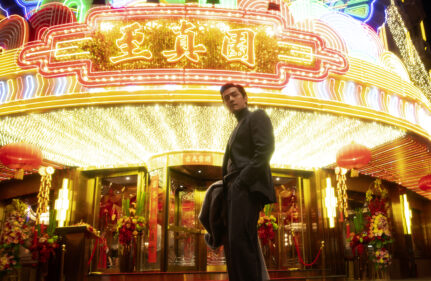Last fall I reviewed a really unusual and beautiful box set
of films by the Polish-born director Walerian Borowczyk for this website. Now
Arrow, the company behind that set, has released what may be Borowczyk’s most
visionary and accomplished live-action feature, 1981’s “The Strange Case Of Dr.
Jekyll And Miss Osbourne.“ The multi-Euro-co-production features a continent
spanning cast, including young German Udo Kier as Jekyll, Italian Marina Pierro
as Fanny Osbourne, his betrothed, Irishman Patrick Magee as an extremely
agitated military man, Swiss exploitation stalwart Howard Vernon, etc.
Borowczyk’s variant on Robert Louis Stevenson’s macabre tale
of man’s dual nature compresses the storyline into one weird night: an evening
at which Dr. Henry Jekyll hosts a dinner party announcing his engagement to the
beautiful and demure Fanny Osbourne. The festivities are rife with
disturbances, however, including the violent sexual murder of one of the
evening’s entertainers. Additionally, Henry keeps dashing off to another part
of the house. Before disappearing, Henry informs his doctor of some changes
he’d like put in his will (Fanny overhears this exchanges), mentioning a
heretofore unheard of “Mr. Hyde.” Once Henry absents himself, the party is
crashed by a wild-eyed, homicidal debaucher who, among other things, ties down
Magee’s general and makes him watch as the general’s daughter enthusiastically
submits herself to all manner of verging-on-hardcore sexual humiliations from
the bounder.

So far, so phallocentric, you might say. But Borowczyk has
an admirably perverse sting for the movie’s tale. Everyone knows that Jekyll
and Hyde are two manifestations of the same man, but Borowczyk declines to give
Kier the actor’s workout the usually dual role demands, and instead has another
actor, of largely different physical type, play Hyde. Gérard Zalcberg is truly
feral in his wide-eyed, fang-bearing depredations. He is an eroticized
manifestation of antisocial nihilism. In this film he comes to life not through
a potion that Jekyll drinks, but rather through a chemical bath in which he
thrashes. And Jekyll goes to the bath over an over, and eventually Fanny finds
him engaging in the transformative cleansing. And the ripe-lipped, wide-eyed
fiancée does not turn away in horror. Rather, she insists on joining him.
Here the movie turns genuinely subversive. Shot throughout
with diffused light that gives the whole thing a feverish, half-remembered
quality, the movie builds inexorably to a (to lift a phrase from Ed Wood)
nightmare of ecstasy, a truly Sadean paroxysm. The film indulges a subversive
impulse that’s genuinely in the realm of the capital-S Surreal. I was reminded
of Luis Buñuel and Salvador Dali’s 1930 mini-feature “L’age d’Or,” whose focus
was on a couple in the most extreme stages of mutual “amour fou”—the viewer
first sees them trying to have sex in a mud puddle—who are constantly separated
and thwarted by societal pressures. “What joy to have murdered our children”
goes a rapturous voice-over in a garden scene just as the couple is about to be
reunited in eye-rolling erotic squalor. Borowczyk’s film is like the Buñuel and
Dali vision suddenly awarded a “happy” ending. Fanny does not physically
transform in Jekyll’s chemical bath, but as the Rolling Stones put it, the
change has come. But rather than operate under the oppressive weight of Hyde’s
appendage, Fanny becomes an equal partner. Bounding a carriage to
who-knows-where at the end, the now fully-compatible couple draws each others’
blood.
The movie’s scarily anarchic tenet is not one that’s exportable
in any post-viewing context, unless you’re keen to land in jail. But in a movie
watching time when any cinematic object offering a bromide of “empowerment” is
praised as “subversive,” it’s refreshing to see a movie that genuinely yearns
for the overturning of the social order, no matter how impractical. Borowczyk’s
vision of sexual freedom as a potentially irresistible force makes for a
powerfully disturbing and admirably direct 90 minute cinema experience. The
Arrow package presents the film in a really beautiful representation, and the
supplements are also first-rate. Exploitation at its most genuinely radical is
up for grabs here.












